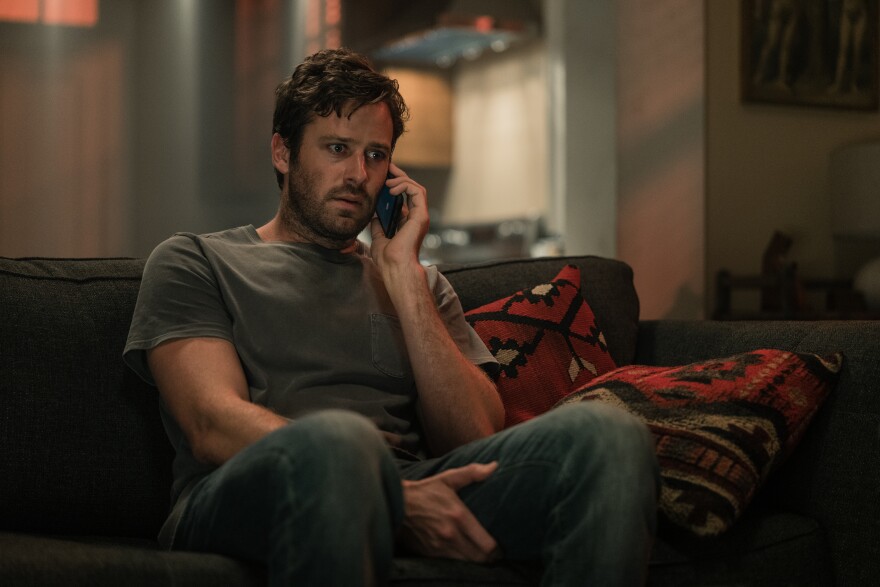If you wanted to manufacture the personification of tall, dark, and handsome in a lab, the result would likely resemble Armie Hammer. He's so infuriatingly good-looking, even his voice is handsome, and that doesn’t even make sense (but it totally makes perfect sense). So, his casting as Will, the "man’s man" at the center of Babak Anvari’s new film, Wounds, could not have been more spot-on. A proud Tulane drop-out, Will makes his bones bartending at Rosie’s, a New Orleans hole-in-the-wall with a small, but loyal clientele. It’s a small castle, but Will is its charming, beloved king.
But then some kids show up, barely 21 if at all, and some mouthbreathers come to carouse with PTSD-addled regular, Eric. Machismo mixes with alcohol and suddenly chairs and tables are upended, Eric takes a broken bottle through his cheek (“I can see inside your mouth.”), and police are on the way. The youngsters bail at the word “cops,” but one of them leaves their phone behind.
Will slips the phone in his back pocket and takes it home with him. In the morning, he shares the story with his live-in girlfriend, Carrie (Dakota Johnson, a low key boss in this). Overnight, the phone received some messages, one of which is a graphic photo of a pool of blood sprinkled with human teeth. Carrie is disturbed and suggests taking the phone to the police. Will shrugs it off - some kids who like make-up effects - and heads back to his life.
But the phone has designs on Will. He has been chosen. Threatening texts and horrifying photos and videos harass Will as he tries to coast back to his life, and as his carefully cultivated carefree existence begins to corrode, his charming veneer starts to crack in turn. Anvari patiently and deliberately sets up the mystery box of the phone and its owners, but the most devious twist in the film has nothing to do with the supernatural. It’s the corruption of its protagonist.

Underneath its more traditional horror trappings, Wounds is really a deconstruction of the American Male. It suggests that our modern ideas of masculinity merely create a hollow shell, and the smallest aggressions, the wounds that even the best of us cannot avoid, leave openings for maligned influences to infect and overtake us. And despite our early impressions of Will, there's ample evidence for why he's selected by these unseen evils.
Will is a drinker and a cheater. He never seems to pour a drink for a patron without a twin for himself. He’s unfaithful to Carrie with Alicia (Zazie Beetz), who knows better, but can’t shake her youthful indiscretions as she’s approaching an age where they can do much more damage. Neither the alcohol nor the women satisfy Will, and he doesn’t have the care or the courage to determine how that could possibly be.
What makes Wounds so compelling is the way our allegiance slowly shifts away from Will and towards the people left in his wake. It doesn’t take much effort for Hammer to be charming, but his slow, dark turn was a fun surprise. The mysteries of the phone are a feint, and the scariest parts of the film were when the more sympathetic characters - especially the women - have to inhabit his space. A scene at the breakfast table between Carrie and Will rings with threat, while still managing to spark with dark humor. Dakota Johnson is an assassin in this scene as she turns the tables on an agitated Will and turns a bowl of cereal into a power move that belongs alongside the pussy hat in the halls of feminist iconography.
I’ve made it this far without really digging into the horror elements of the film. That wasn’t really deliberate. This is a horror film with plenty of jumps and starts and gross outs. In some of its best moments it uses subtlety and surreality to ratchet up its steady, slow burn. But Wounds has more on its mind than getting our pulses up. It savages the myth of the Cool Guy and demonstrates the contagion of spiritual injury. Those in proximity to the wounded will not escape without wounds of their own.
Or in other words, carefree comes with a cost.





